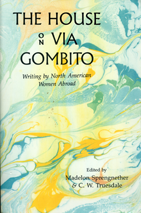Italy’s regions hold fiercely to their cooking. Polenta made of corn in the Po Valley, region of immense corn fields. The Veneto influenced by French, wine-based meat sauces. Olives and bread in Sicily. Cheeses throughout, especially cheeses made from goat’s and sheep’s milk, some of which reach back so far into antiquity that their origins probably aren’t traceable with any scientific exactitude. Languages too, or what in the United States we’d call dialects, remain locked in histories so vastly different that in a country our size, it’s hard to believe their narrow specificity. That is, unless you scroll back maybe fifty years to the time before national television dominated our senses. Since I grew up in South Carolina speaking my mother’s Midwestern American English, I was keenly aware of how different my classmates sounded from my mother, my sister and myself.
Not to mention my father who on Saturday, roaming around our apartment in The Old Citadel, uttered Italian diminutives like “porcheluzza”–big fat ugly pig, or porcellina–sweet little pig, or the worst, porcaccia–gross, disgusting sow! He delivered each, depending on our behavior and his mood. He also occasionally lapsed into a kind of ditty,
Uno, due, tre cancella
Suona, suona, suona bella
Ecco si, ecco no, then came
Bum bum bum and some
sense that the opponent
was leveled to the pavement.
The most I ever deciphered suggested that this rhyme had to do with a fight, bells ringing to announce the funeral, and then some sort of victory dance. But this is almost pure fabrication. I have no idea what the ditty implied.
My father, the lone Italian-American in Charleston, surrounded by his Waspish family of three women, Waspish colleagues and communicants in school and church, and then many African-Americans whom I, for one, could barely understand–my father could have propounded any number of strange Italian dialects on us and we wouldn’t have known the difference.
Had I been older and wiser, more given to rumination about origins and tongues, I might have paused in my scorn of his silliness (scorn mixed with affection and even curiosity). I might have written his account of this ditty. But I was speeding out of immigrant identity toward one that could “pass” among Charleston’s two ethnic/racial groups: English/Scotch-Irish (with a sprinkling of French Huguenots) and African-Americans. In my grade school classes at Ashley Hall, the private girls school paid for with my North Dakota grandfather’s money, there was one other dark-haired girl. She was Jewish, which I knew nothing about, and thus in my headlong, unquestioned sprint toward uniformity, never investigated.
Over the years, as I return again and again to Italy, I relish the localism of its food, but can’t really penetrate its dialects, though I can hear the broadening of “sc” sounds in the Tuscan. My friend Grazia, born in FLorence but with a Genovese mother, speaks standard Italian with that slight aspirated element. I hear the hint of the Veneto in Giangi, my friend Pat Smith’s husband. These tiny intimations of the vast dialectical riches in Italy remind me of a saying that describes the best Italian: “lingua Toscana in bocca Romana” or the Tuscan dialect spoken by a Roman–literally, the language of Tuscany in a Roman mouth.
The one and only time I met my father in Italy, he slumped on the bed in a Neapolitan grattacielo, or literally sky-scraper, depressed because an airport taxi driver had tried to swindle him. But what truly troubled him was the fact that the man spoke the Neapolitan dialect and my father couldn’t entirely penetrate it. “What happened to la lingua d’oro?” he moaned. The golden language of Dante, he went on. Well, Dante’s Italian was Tuscan, on its way to becoming standard but not there yet. Probably my father knew this, except in the shock of arrival (I’m guessing a decade had passed since he’d last been in Italy), he cried out for the uniformity of language that allows strangers to enter an unfamiliar town and, especially if they’re compatriots, communicate easily with each other. We’re getting there in the United States, at least in airports and train stations. But visiting the byways by car, one can still hear localisms and pronunciations that sound odd. Vive la difference, I say. Why would we ever want Kentucky to sound like Montana?


Leave a Reply